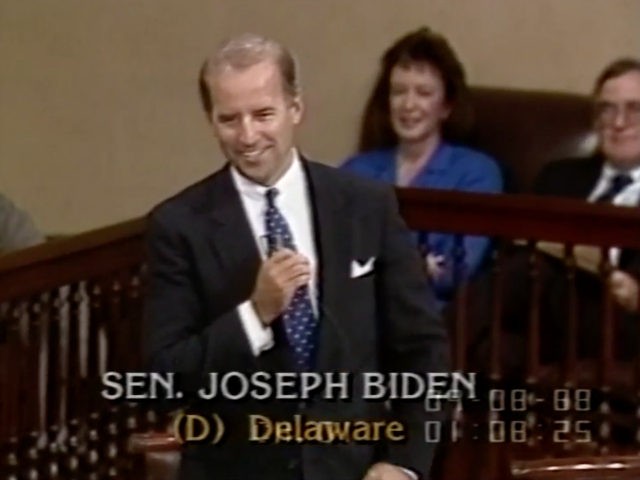Former Vice President Joe Biden argued in favor of regime change in Iraq as early as 1998—nearly five years before he voted for the Iraq War authorization, according to a new report by The Intercept.
In September 1998, as the ranking member of the Senate Foreign Relations Committee, then-Senator Biden was tasked with helping preside over hearings into the progress Iraq had made in destroying its cache of chemical weapons as agreed upon at the conclusion of the Gulf War.
In particular, the committee was keen to hear the testimony of Scott Ritter, a former U.N. weapons inspector who resigned in protest from his position over what he viewed as inadequate support for those tasked with ensuring Iraq followed through with destroying its weapons stockpile.
Throughout the course of the hearings, as the Intercept’s Washington, D.C. Bureau Chief Ryan Grim detailed on Tuesday, Biden signaled the only way to eliminate the threat posed by Iraq’s chemical arsenal was to remove the country’s despotic leader, Saddam Hussein.
Biden told Ritter and his colleagues on the committee:
You and I believe, and many of us believe here, as long as Saddam is at the helm, there is no reasonable prospect you or any other inspector is ever going to be able to guarantee that we have rooted out, root and branch, the entirety of Saddam’s program relative to weapons of mass destruction.
The senator added that such an approach would not be easy and would require sending, most likely without the support of the international community, soldiers into Iraq to take “Saddam down.”:
You and I both know, and all of us here really know, and it’s a thing we have to face, that the only way, the only way we’re going to get rid of Saddam Hussein is we’re going to end up having to start it alone—start it alone—and it’s going to require guys like you in uniform to be back on foot in the desert taking this son of a—taking Saddam down.
The revelations come as Biden finds himself in a precarious situation after President Donald Trump ordered the assassination of Qasem Soleimani, an Iranian general whom U.S. intelligence confirmed was planning an “imminent attack” on U.S. military personnel.
The general’s death, broadly viewed as positive given he is acknowledged to have been responsible for the deaths of countless American troops in the Middle East, has resulted in escalated tensions between the U.S. and Iran.
As such, a significant portion of the Democrat base, led by Sens. Bernie Sanders (I-VT) and Elizabeth Warren (D-MA), has become enflamed at the specter of war and begun lashing out at Trump and politicians seen as generally supportive of military intervention abroad.
Biden, more so than any other 2020 Democrat, has been in the crosshairs of the backlash to the Soleimani assassination on the left. Partially that results from the fact that the former vice president is the only candidate in the field to have voted for the Iraq War.
Aside from the vote, more troubling for progressives is that Biden supported the conflict throughout its early days, even applauding then-President George W. Bush for having chosen a “course of moderation and deliberation.”
Perhaps sensing that history could damage his White House ambitions, Biden has attempted, in recent days, to rewrite the past in his political favor. Over the weekend, during a rally in Iowa, the former vice president claimed he opposed the Iraq War from its immediate launch, according to Bloomberg News:
He [Bush] looked me in the eye in the Oval Office and promised me all he was doing was wanting to get the authority to be able to send in inspectors to find out if Saddam Hussein was hiding nuclear weapons. The president then went ahead with ‘Shock and Awe’ and right after that and from the very moment he did that, I opposed what he was doing and spoke to him.
That claim, however, stood in contrast not only to his comments from 1998—in which he argued inspectors would be of no value as long as Hussein remained in power—but also the official timeline of his opposition to the war.
Contrary to his recent assertion, the former vice president did not come out against the conflict until nearly three years after it began, and even then he couched his opposition was more on Bush’s management of the war than its reasoning.
Biden said during an appearance on Meet the Press in November 2005, “It was a mistake. It was a mistake to assume the president would use the authority we gave him properly. … We gave the president the authority to unite the world to isolate Saddam. And the fact of the matter is, we went too soon. We went without sufficient force. And we went without a plan.”

COMMENTS
Please let us know if you're having issues with commenting.